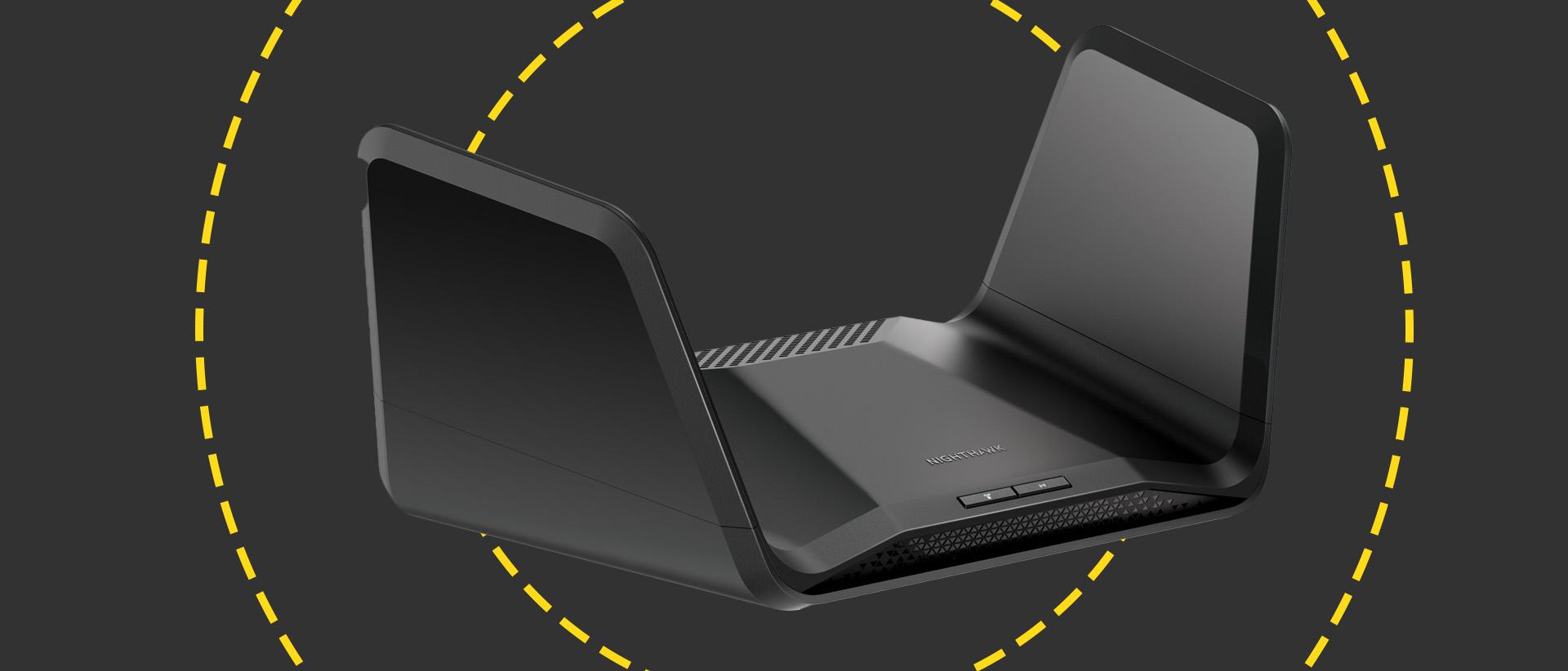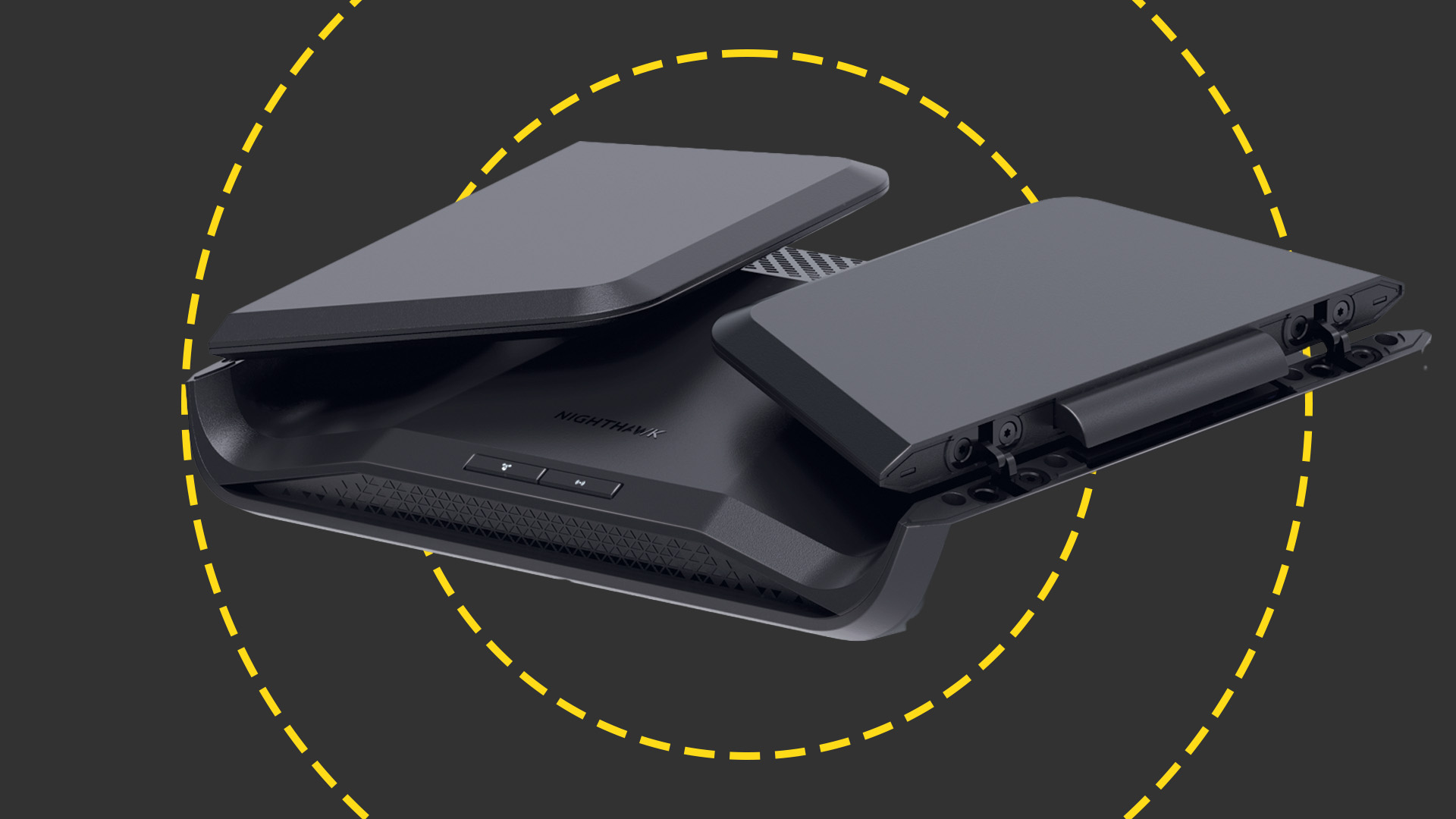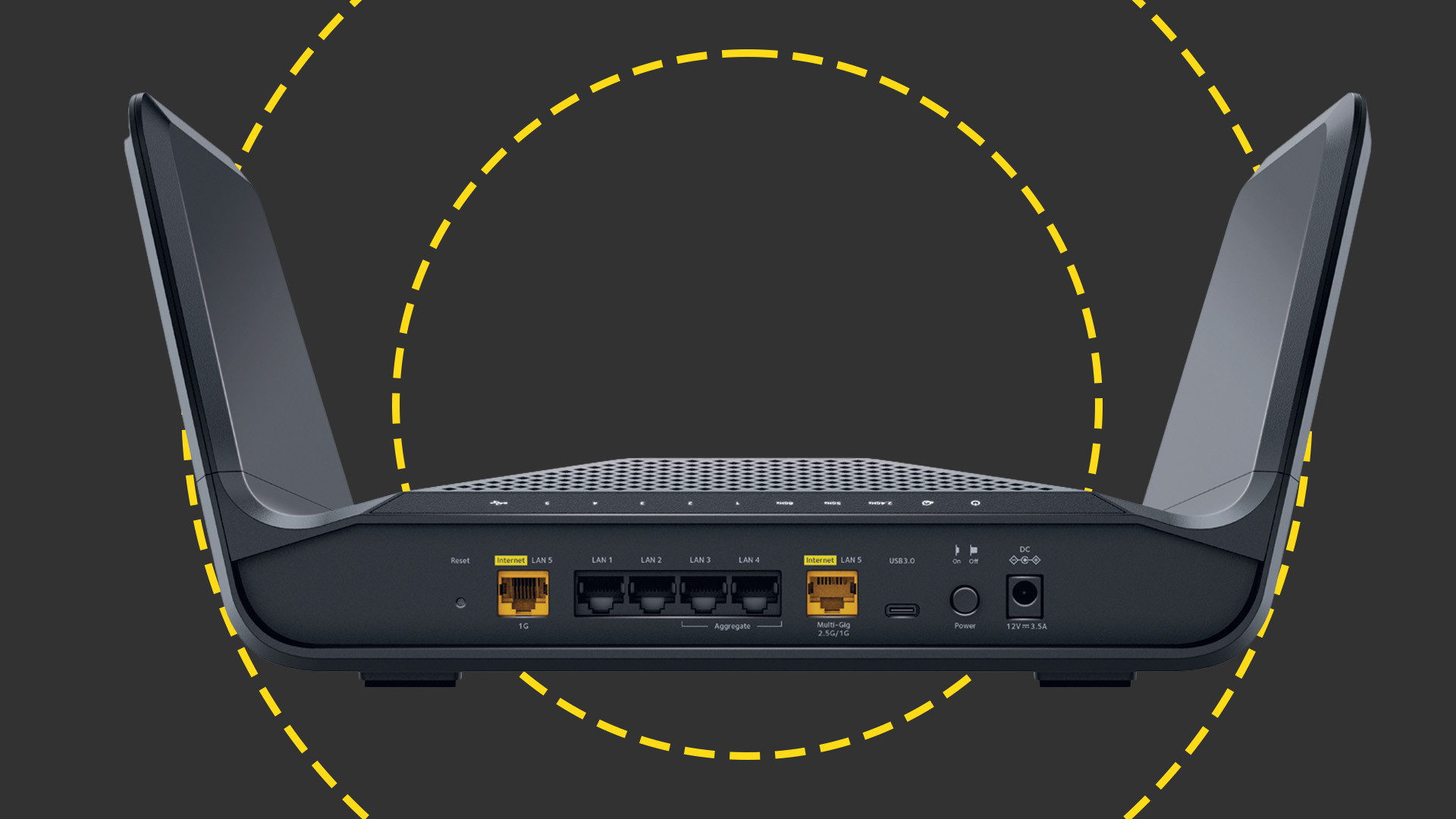Netgear Nighthawk RAXE300 review: Industry-leading performance on a budget
The Nighthawk RAXE300 is not quite as powerful as its top-of-the-range sibling, but still a hugely fast and versatile Wi-Fi 6E router

-
+
Affordable
-
+
Fast
-
+
Versatile software support

If you're looking for the fastest domestic router around, Netgear's mighty Nighthawk RAXE500 has a firm grip on the crown. In our performance tests, we measured incredible download speeds of more than 100MB/sec over Wi-Fi 6E, even from a room or two away.
However, at £550 the RAX500 is well out of reach of most home offices. That's where the RAXE300 comes in: it's hardly a pocket-money purchase, but it's significantly cheaper than its sibling while aiming to provide a similar all-round experience.
If you pore over the specs you can spot where the savings have been made. The RAXE500 supports speeds of up to 4.8Gbits/sec on both the 5GHz and 6GHz bands. The RAXE300 keeps the same 5GHz radio, but chops the 6GHz bandwidth in half, to a maximum of 2.4Gbits/sec.
The RAXE300 has six antennas embedded in its upturned wings, versus the eight on the RAXE500. And while Netgear doesn't publish details of transmission power, the RAXE300 is advertised to cover an area of 230m2, while the RAXE500 claims a much greater 325m2.

Still, it's good to see that Netgear hasn't ditched the single 2.5Gbits/sec Ethernet socket, which sits at the rear next to four regular Gigabit Ethernet ports. And it's still possible to aggregate two of these together, giving you two ways to achieve a multi-gigabit wired connection.
We tested performance by copying files between a Wi-Fi 6E-enabled laptop and a NAS appliance connected to the router's 2.5GbE socket. We weren't disappointed with the results: with the laptop in the same room as the router, we saw a superb download speed of 142MB/sec. And in the downstairs living room we measured a still excellent 106MB/sec.
These speeds don't quite match the RAXE500, which gave us 152MB/sec and 136MB/sec in the same locations, but the RAXE300 blew every other rival out of the water. The Asus ROG Rapture GT-AXE11000 gave out 127MB/sec and 82MB/sec respectively – and at £480 it's more expensive.
Sign up today and you will receive a free copy of our Future Focus 2025 report - the leading guidance on AI, cybersecurity and other IT challenges as per 700+ senior executives
Moving up to another floor, we saw the RAXE300's download speeds drop to 54MB/sec, while in the kitchen area we got 50MB/sec. If you want more even speeds throughout your home or small office, a mesh might suit you better – TP-Link's Deco XE75 gave us 82MB/sec on another floor and 65MB/sec in the kitchen area. It couldn't match the Netgear's highest speeds, though, topping out at 84MB/sec for a same-room connection.

Note that devices needn't support 6GHz connections to get stellar performance from the RAXE300. We repeated the tests with a regular Wi-Fi 6 laptop and still got a phenomenal 125MB/sec in the same room, falling to 37MB/sec in the kitchen area. Whatever devices you connect to this router, and however demanding they may be, bandwidth won't be a problem.
As for software, there's nothing to choose between the RAXE300 and the pricier RAXE500. Both routers run the standard Nighthawk firmware, and can be managed from either the Nighthawk mobile app or a pokey-looking web portal.
The app provides easy setup – just scan the QR code with your phone's camera – and lets you check up on connected devices and tweak basic Wi-Fi settings. It also includes a powerful Wi-Fi analytics module, with which you can scan the airwaves to work out how best to configure and situate the router. The web interface provides advanced settings like DHCP configuration and port forwarding.
You can also configure file and media sharing through the RAXE300's single USB-C port, and turn on a VPN server to allow secure access to your home network, though there's no support for outbound VPN connections. The big features are optional extras. Netgear's Parental Controls module costs an extra £50 a year, while the Armor security service is £34 for the first year, rising to £85 a year for renewals.
The fees are galling when you're already paying for a premium router such as this, but there it is. It's hard not to define the Netgear Nighthawk RAXE300 in terms of its titanic cousin. But if you can forget for a moment that the RAXE500 exists, what you're left with is one heck of a router in its own right.
It's hugely fast, with top-of-the-range wireless networking and multi-gigabit wired connectivity, and it's supported by a versatile software suite. Indeed, the most impressive thing about the RAXE300 is that, despite its positioning in the market, it doesn't feel like a compromise. Sure, if you really need the bragging rights you can spend the extra £150 on the RAXE500. But the Netgear Nighthawk RAXE300 hits a much sweeter spot: to anyone craving industry-leading performance on something loosely resembling a budget, it's all but irresistible.
Netgear Nighthawk RAXE300 specifications
| Band support | Tri-band 2.4GHz/5GHz/6GHz Wi-Fi 6E router |
| Radios | 6 internal antennas |
| Ports | 4 x Gigabit Ethernet ports, 2.5GbE port USB-C 3.2 Gen 1 |
| Dimensions (WDH) | 347 x 208 x 164mm |
Darien began his IT career in the 1990s as a systems engineer, later becoming an IT project manager. His formative experiences included upgrading a major multinational from token-ring networking to Ethernet, and migrating a travelling sales force from Windows 3.1 to Windows 95.
He subsequently spent some years acting as a one-man IT department for a small publishing company, before moving into journalism himself. He is now a regular contributor to IT Pro, specialising in networking and security, and serves as associate editor of PC Pro magazine with particular responsibility for business reviews and features.
You can email Darien at darien@pcpro.co.uk, or follow him on Twitter at @dariengs.
-
 Why Anthropic sent software stocks into freefall
Why Anthropic sent software stocks into freefallNews Anthropic's sector-specific plugins for Claude Cowork have investors worried about disruption to software and services companies
By Nicole Kobie Published
-
 Dell Technologies eyes fresh market opportunities with 2026 partner program
Dell Technologies eyes fresh market opportunities with 2026 partner programNews The tech giant has updated its channel program with new incentives and initiatives to drive partner growth
By Daniel Todd Published
-
 Ransomware gangs are sharing virtual machines to wage cyber attacks on the cheap – but it could be their undoing
Ransomware gangs are sharing virtual machines to wage cyber attacks on the cheap – but it could be their undoingNews Thousands of attacker servers all had the same autogenerated Windows hostnames, according to Sophos
By Emma Woollacott Published
